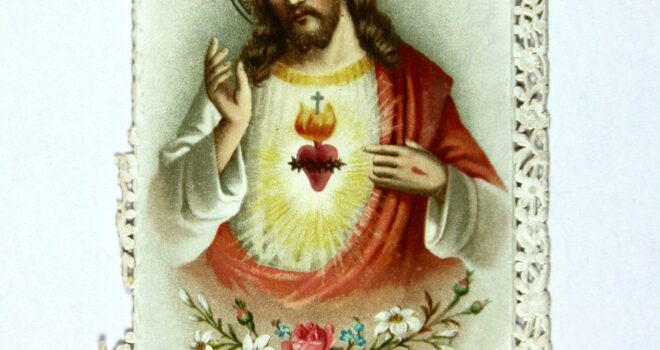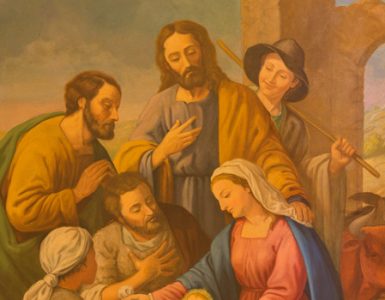Jer 31:31-34; Heb 5:7-9; Jn 12:20-33
“Father, glorify your name.”
I learned very early in my formation years in the seminary that I had to pray fervently to become a holy and faithful Catholic priest and to persevere faithfully in the priestly vocation. I was edified by the example of my confreres too who mirrored to me the power of prayer in the life and ministry of a priest and religious.
However, in light of all the challenges and struggles of the priestly vocation and our personal weaknesses, I have come to realize that praying, no matter how frequent or how intense, is not enough. For us to be faithful to our various vocations in the Church always, we must also strive to pray like Jesus Christ.
There are five qualities in the prayer of Jesus by which He was faithful to His vocation and mission from the Father.
Firstly, Jesus prayed all the time. In Jn 12:20-33, Jesus experienced success in His mission when He heard that the wisdom-loving Greeks were looking for Him, “Sir, we would like to see Jesus.” He also felt troubled knowing that the hour of His passion and death had come, “The hour has come for the Son of Man to be glorified…unless the grain of wheat falls to the ground and dies, it remains just a grain of wheat.” Facing both acceptance and ultimate rejection, He said, “I am troubled now. Yet what should I say?”
Jesus was neither carried away by His visible success nor discouraged by the suffering to come because He chose to pray at that very moment, “Father, glorify your name.” Jesus prays at both good and bad times.
The letter to the Hebrews describes the constancy of Jesus’ prayer in these words, “In the days when Christ was in the flesh, He offered prayers and supplications with loud cries and tears to the One who was able to save Him from death.”(Heb 5:7) He persevered in prayers even as He shed tears and made loud cries to the Father.
We too must pray all the time. Some of us pray only when things are going well and we have no problems or challenges. Others pray only when things are going bad and they feel overwhelmed. We too cannot be carried away by our successes or discouraged by our failures. Without constancy in prayer, we cannot fulfill the demands of our vocations.
Secondly, Jesus prayed because He was loved by the Father. He always called God His Father. He saw God as His loving Father, even in the throes of death, “Father, into your hands I entrust my spirit” (Luke 23:46) He knew that the Father loved Him, no matter His condition or situation in life, whether He was being successful or appearing to be a failure. He knew that His Father’s love would be effective even in the grave to raise Him up. His prayer was prompted by the love of the Father for Him and His own resolve to love the Father too.
We too must pray to God as our Father because we are always loved by Him as His children, and we want to “abide in this love.”(Jn 15:10) We too must pray whether we have sins or virtues, success or failure, acceptance or rejection, health or sickness, peace, or disquiet, etc. Our prayers cannot be as constant as Jesus’ if they are based only on our conditions in life. God may not give us what we ask for in prayer but He always strengthens our wills to obey Him when we pray out of love for Him.
Thirdly, Jesus prayed for the Father to be glorified. Jesus’ life and prayer were not focused on His own preference or gain but that the Father be better known and loved by all, “By this is my Father glorified that you become my disciples and so bear fruit.”(Jn 15:8) This is the type of prayer that the Father answers immediately – prayer that seeks to glorify Him above all things, “I have glorified it, and I will glorify it again.”
Our prayer too cannot be focused only on what we want in life or what we think will make us happy. Everything that we do in the Christian spiritual life – our relationships, prayers, activities, sexuality, sufferings, etc., – should all be directed at the greater glory of God. We have no business in anything that exalts us to the point of denying God the glory that is due to Him. We receive everything when we “seek the kingdom of God and His righteousness” (Mt 6:33) above everything else. Jesus assures us that we will not go unrewarded when we seek the Father’s glory, “The Father will honor whoever serves me.”
Finally, Jesus’ prayer ultimately led Him to obedience. Jesus did not just pray for the Father to be glorified. He also pursued the Father’s glory by His readiness to pay any price for His obedience to the Father, “Son though He was, He learned obedience from what He suffered.”(Heb 5:8) He was even ready to pay obedience’s ultimate price of death on the cross, “And when I am lifted up, I will draw all men to myself.’ He said this indicating the type of death He would die.’”
Jesus prayed and obeyed the Father always to gain our salvation. Because He is always drawing us to Himself along the path of loving obedience, there is no salvation for us if we do not obey God always like Jesus, “He became the source of eternal salvation for all who obey Him.” Praying like Jesus should bring us to obey God always like Jesus and begin to enjoy even now the joyful hope of eternal salvation.
My dear brothers and sisters, it is so easy for us to be deceived into thinking today that every single person is going to attain eternal life, no matter how we rebel against Jesus Christ, ignore His words, reject His merciful love, and resist the prompting of His graces. We may think that receiving baptism, being born again, attending Mass regularly, going to confession frequently, praying always, and reading our Bibles will somehow bring us to attain eternal life. These things, good and necessary as they are, are useless if they do not also bring us to share in the loving obedience of Jesus Christ to the Father, “Not only those who say to me, ‘Lord, Lord,’ will enter the kingdom of heaven, but those who do the will of my heavenly Father.”(Mt 7:21)
Jesus, who understands the struggles that we face to obey Him and be faithful to our commitments, comes to us always in each Eucharist. He always offers us His unconditional love for us in the Holy Mass, the highest prayer, as well as a share in His own loving obedience to the Father.
It is not enough to share in Jesus’ prayer at each Mass. We must also pray like Him so that we too can obey God in our vocations like Him and come to be glorified by the Father like Him and with Him.
Glory to Jesus! Honor to Mary!
Photo by Museums Victoria on Unsplash










